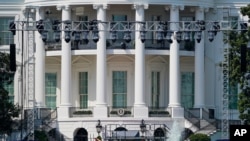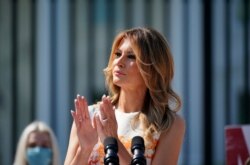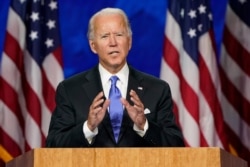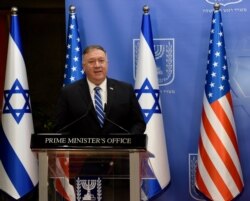The use of the White House by President Donald Trump and first lady Melania Trump for events related to this week’s Republican National Convention are legal, according to the U.S. Office of Special Counsel.
For others working in the White House and the administration, however, there are lines not to be crossed, according to the Hatch Act, a 1939 federal law that prohibits most government officials from engaging in political activities while on the job.
Trump administration officials have been cited for breaking the Hatch Act 13 times by federal investigators at the Office of Special Counsel, an independent federal investigative and prosecutorial agency. At least a dozen more investigations are apparently under way, according to executive branch sources and legal watchdog groups.
“White House counsel has been very, very strict with us. They’ve sent out many, many one-pagers and emails explaining what can and can’t be done,” Stephanie Grisham, the first lady’s chief of staff, replied to a question Tuesday from VOA. “Everybody needs to do things on their own time. You cannot use government equipment — all of those things. So, it’s being very, very strictly adhered to.”
The first lady used the newly renovated Rose Garden as the site for her live address Tuesday night to the Republican Party’s convention, which formally renominated her husband Monday.
A few meters away, lights, speakers and a stage, with ample space for an invited audience, have been erected on the White House South Lawn for Thursday night’s nomination acceptance speech by the president. Trump’s address is to be followed by fireworks launched from the National Mall.
“The president and vice president are not covered by any of the provisions of the Hatch Act. Accordingly, the Hatch Act does not prohibit President Trump from delivering his RNC acceptance speech on White House grounds,” Erica Hamrick, deputy chief of the Hatch Act Unit at the Office of Special Counsel, wrote this month in a written response to the House Oversight Committee.
That has not quelled criticism about the use of the White House for an explicitly political event.
For much of his presidency, Trump has used official events, including news conferences and speeches inside and out of the White House, to repeatedly attack his political foes.
Conventions during the pandemic
Due to the coronavirus pandemic, Republicans and Democrats significantly scaled back their political conventions. Former Vice President Joe Biden and his running mate, Sen. Kamala Harris, made their acceptance speeches in Biden’s hometown of Wilmington, Delaware, with only a few dozen journalists and campaign staff in the room.
Trump traveled Monday to Charlotte, North Carolina, the first day of his party’s event, to speak to several hundred delegates. In the evening, the convention’s program contained two events with the president and guests in the White House specifically taped for the telecast.
Vice President Mike Pence is scheduled to deliver his nomination acceptance speech Wednesday evening at Fort McHenry in Maryland, the site of a battle in the War of 1812 that inspired The Star-Spangled Banner, the U.S. national anthem.
Expenses, including travel, that are deemed political are supposed to be paid by the president’s reelection campaign, not the U.S. government.
If Trump delivers his acceptance speech on White House grounds, this decision will violate ethics norms established by former presidents, said Georgia Lyon, a communications fellow at the nonpartisan Campaign Legal Center.
“There have been a variety of ways the White House has been used in the past for influencing elections that may have run afoul of the law,” Scott Bloch, head of the Office of Special Counsel from 2003 to 2008, told the Government Executive newsletter. He cited the Bill Clinton administration renting out areas of the White House for fundraisers and the administration of George H.W. Bush using federal funds and resources to help Republican candidates.
However, former Presidents George W. Bush and Barack Obama tried to ensure the line was not crossed between their duties as public servants and political candidates. They were observed keeping political activities at the White House limited to the residence area or those that are not regularly used solely in the discharge of official duties, in accordance with the Hatch Act.
Pompeo speech
There is one other current significant departure from precedent – Secretary of State Mike Pompeo’s address to the Republican convention Tuesday night will be from Israel during a diplomatic trip.
“It’s a break in tradition – one of many breaks in tradition that we can associate with the Trump presidency,” Matthew Continetti, resident fellow at the American Enterprise Institute, told VOA.
Pompeo, a former congressman, is doing it, not only to maintain his presence in Republican politics – looking beyond the Trump administration – but “also to remind the viewers that the Trump administration is not without accomplishments in the foreign policy arena,” Continetti said.
It is rare for the nation’s top diplomat to engage is such an explicitly political act.
The speech by Pompeo during an overseas mission is a “blatant use of office for overtly political purposes” that undermines the critical work being done by the State Department, Biden’s deputy campaign manager, Kate Bedingfield, said.
A State Department official said Pompeo’s address was being done in his personal capacity.
Even if any activities by Trump administration officials result in findings that they violated the Hatch Act, punishment is left to their bosses. Trump has not acted against those working for him already deemed violators.
Some of his aides privately scoff at the Hatch Act and say they take pride in violating its regulations, according to The New York Times.
Patsy Widakuswara contributed to this report.








